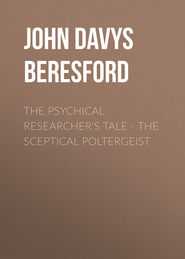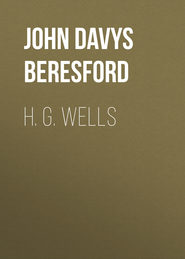По всем вопросам обращайтесь на: info@litportal.ru
(©) 2003-2024.
✖
The Wonder
Настройки чтения
Размер шрифта
Высота строк
Поля
I found nothing better to say than a repetition of the old phrase. "That's a very remarkable baby of yours, Stott," I said.
"Ah!" he replied, his usual substitute for "yes," and he picked up a piece of dead wood and threw it into the little pond.
"How old is he?" I asked.
"Nearly two year."
"Can he …" I paused; my imagination was reconstructing the scene of the railway carriage, and I felt a reflex of the hesitation shown by the rubicund man when he had asked the same question. "Can he … can he talk?" It seemed so absurd a question to ask, yet it was essentially a natural question in the circumstances.
"He can, but he won't."
This was startling enough, and I pressed my enquiry.
"How do you know? Are you sure he can?"
"Ah!" Only that irritating, monosyllabic assent.
"Look here, Stott," I said, "don't you want to talk about the child?"
He shrugged his shoulders and threw more wood into the pond with a strained attentiveness as though he were peculiarly anxious to hit some particular wafer of the vivid, floating weed. For a full five minutes we maintained silence. I was trying to subdue my impatience and my temper. I knew Stott well enough to know that if I displayed signs of either, I should get no information from him. My self-control was rewarded at last.
"I've 'eard 'im speak," he said, "speak proper, too, not like a baby."
He paused, and I grunted to show that I was listening, but as he volunteered no further remark, I said: "What did you hear him say?"
"I dunno," replied Stott, "somethin' about learnin' and talkin'. I didn't get the rights of it, but the missus near fainted—she thinks 'e's Gawd A'mighty or suthing."
"But why don't you make him speak?" I asked deliberately.
"Make 'im!" said Stott, with a curl of his lip, "make 'im! You try it on!"
I knew I was acting a part, but I wanted to provoke more information. "Well! Why not?" I said.
"'Cos 'e'd look at you—that's why not," replied Stott, "and you can't no more face 'im than a dog can face a man. I shan't stand it much longer."
"Curious," I said, "very curious."
"Oh! he's a blarsted freak, that's what 'e is," said Stott, getting to his feet and beginning to pace moodily up and down.
I did not interrupt him. I was thinking of this man who had drawn huge crowds from every part of England, who had been a national hero, and who, now, was unable to face his own child. Presently Stott broke out again.
"To think of all the trouble I took when 'e was comin'," he said, stopping in front of me. "There was nothin' the missus fancied as I wouldn't get. We was livin' in Stoke then." He made a movement of his head in the direction of Ailesworth. "Not as she was difficult," he went on thoughtfully. "She used to say 'I mussent get 'abits, George.' Caught that from me; I was always on about that—then. You know, thinkin' of learnin' 'im bowlin'. Things was different then; afore 'e came." He paused again, evidently thinking of his troubles.
Sympathetically, I was wondering how far the child had separated husband and wife. There was the making of a tragedy here, I thought; but when Stott, after another period of pacing up and down, began to speak again I found that his tragedy was of another kind.
"Learn 'im bowling!" he said, and laughed a mirthless laugh. "My Gawd! it 'ud take something. No fear; that little game's off. And I could a' done it if he'd been a decent or'nery child, 'stead of a blarsted freak. There won't never be another, neither. This one pretty near killed the missus. Doctor said it'd be 'er last.... With an 'ead like that, whacher expect?"
"Can he walk?" I asked.
"Ah! Gets about easy enough for all 'is body and legs is so small. When the missus tries to stop 'im—she's afraid 'e'll go over—'e just looks at 'er and she 'as to let 'im 'ave 'is own way."
II
Later, I reverted to that speech of the child's, that intelligent, illuminating speech that seemed to prove that there was indeed a powerful, thoughtful mind behind those profoundly speculative eyes.
"That time he spoke, Stott," I said, "was he alone?"
"Ah!" assented Stott. "In the garden, practisin' walkin' all by 'imself."
"Was that the only time?"
"Only time I've 'eard 'im."
"Was it lately?"
"'Bout six weeks ago."
"And he has never made a sound otherwise, cried, laughed?"
"'Ardly. 'E gives a sort o' grunt sometimes, when 'e wants anything—and points."
"He's very intelligent."
"Worse than that, 'e's a freak, I tell you."
With the repetition of this damning description, Stott fell back into his moody pacing, and this time I failed to rouse him from his gloom. "Oh! forget it," he broke out once, when I asked him another question, and I saw that he was not likely to give me any more information that day.
We walked back together, and I said good-bye to him at the end of the lane which led up to his cottage.
"Not comin' up?" he asked, with a nod of his head towards his home.
"Well! I have to catch that train …" I prevaricated, looking at my watch. I did not wish to see that child again; my distaste was even stronger than my curiosity.
Stott grinned. "We don't 'ave many visitors," he said. "Well, I'll come a bit farther with you."
He came to the bottom of the hill, and after he left me he took the road that goes over the hill to Wenderby. It would be about seven miles back to Pym by that road....
III
I spent the next afternoon in the Reading Room of the British Museum. I was searching for a precedent, and at last I found one in the story of Christian Heinrich Heinecken,[2 - See the Teutsche Bibliothek and Schoneich's account of the child of Lubeck.] who was born at Lubeck on February 6, 1721. There were marked points of difference between the development of Heinecken and that of Stott's child. Heinecken was physically feeble; at the age of three he was still being fed at the breast. The Stott precocity appeared to be physically strong; his body looked small and undeveloped, it is true, but this was partly an illusion produced by the abnormal size of the head. Again Heinecken learned to speak very early; at ten months old he was asking intelligent questions, at eighteen months he was studying history, geography, Latin and anatomy; whereas the Stott child had only once been heard to speak at the age of two years, and had not, apparently, begun any study at all.
From this comparison it might seem at first that the balance of precocity lay in the Heinecken scale. I drew another inference. I argued that the genius of the Stott child far outweighed the genius of Christian Heinecken.
Little Heinecken in his four years of life suffered the mental experience—with certain necessary limitations—of a developed brain. He gathered knowledge as an ordinary child gathers knowledge, the only difference being that his rate of assimilation was as ten to one.
But little Stott had gathered no knowledge from books. He had been born of ignorant parents, he was being brought up among uneducated people. Yet he had wonderful intellectual gifts; surely he must have one above all others—the gift of reason. His brain must be constructive, logical; he must have the power of deduction. He must even at an extraordinarily early age, say six months, have developed some theory of life. He must be withholding his energy, deliberately; declining to exhibit his powers, holding his marvellous faculties in reserve. Here was surely a case of genius which, comparable in some respects to the genius of Heinecken, yet far exceeded it.
As I developed my theory, my eagerness grew. And then suddenly an inspiration came to me. In my excitement I spoke aloud and smacked the desk in front of me with my open hand. "Why, of course!" I said. "That is the key."








